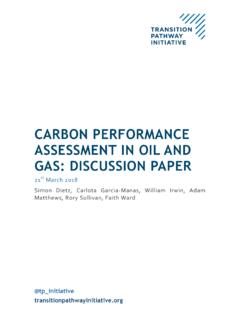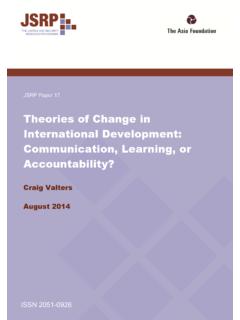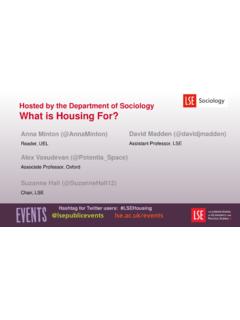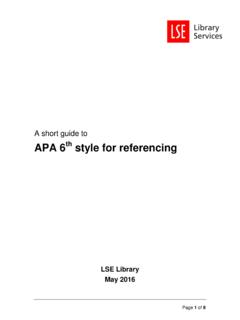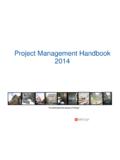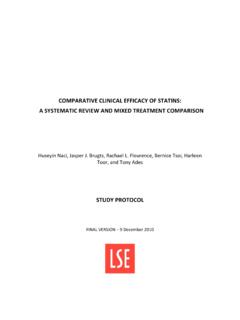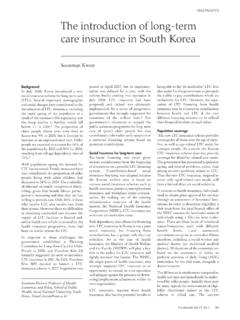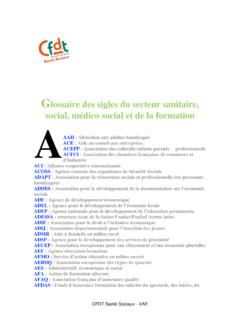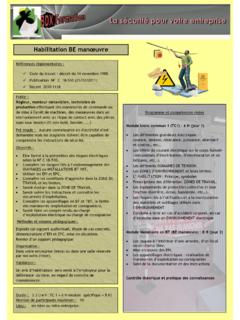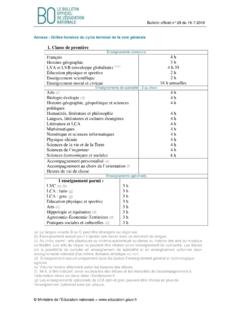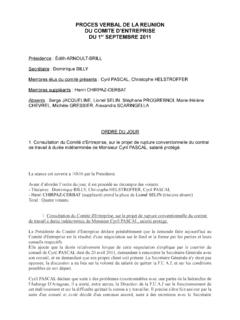Transcription of The future of Europe’s economy: Disaster or deliverance?
1 The future of Europe s economy Disaster or deliverance ? Paul De Grauwe, George Magnus, Thomas Mayer and Holger SchmiedingSeptember 2013 Advisory boardEsko AhoSenior Fellow, Harvard University, Consultative Partner for Nokia and former Finnish Prime Minister Giuliano AmatoFormer Italian Prime MinisterNick ButlerVisiting Fellow and Chairman, King s Policy Institute at King s College LondonTim ClarkFormer Senior Partner, Slaughter & MayIain ConnGroup Managing Director and Chief Executive, Refi ning & Marketing, BP Robert CooperGroup Special Adviser to the High Representative and Former Counsellor, European External Action ServiceTimothy Garton AshProfessor, European Studies, University of OxfordHeather GrabbeDirector.
2 Open Society European Policy Institute Brussels and Director of EU aff airs, Soros NetworkPaul de GauweJohn Paulson Chair in European Political economy , Head of the European Institute, London School of EconomicsLord HannayFormer Ambassador to the UN & the EULord HaskinsFormer Chairman, Northern FoodsFran ois HeisbourgSenior Adviser, Fondation pour la Recherche Strat giqueSimon HenryChief Financial Offi cer, Royal Dutch Shell plcSusan HitchManager, Lord Sainsbury of Turville s pro bono projectsWolfgang IschingerGlobal Head, Government Aff airs, AllianzLord Kerr (Chair)Deputy Chairman, Scottish PowerCaio Koch-WeserVice Chairman, Deutsche Bank GroupSir Richard LambertSenior Independent Advisor, Deutsche Bank and Former Director General, CBIP ascal LamyHonorary president of Notre Europe - Jacques Delors Institute David MarshChairman, OMFIFD ominique Mo siSenior Adviser, Institut Fran ais des Relations InternationalesLord MonksFormer General Secretary, European Trade Union ConfederationChristine OckrentFormer CEO, Audiovisuel Ext rieur de la FranceMichel PetiteLawyer (of Counsel)
3 , Cliff ord Chance, ParisStuart PophamVice Chairman, EMEA, CitiLord RobertsonDeputy Chairman, TNK-BP and former Secretary General, NATOR oland RuddChairman, Business for New EuropeKori SchakeHoover Fellow and Distinguished Professor at West Point Sir Nigel SheinwaldDirector, Royal Dutch Shell and Visiting Professor, King s College LondonLord SimonDirector, GDF Suez and former Minister for Trade and Competitiveness in EuropeLord TurnerSenior Fellow, Institute for New Economic ThinkingAnt nio VitorinoPresident, Notre Europe and former European CommissionerSir Nigel WicksChairman, British Bankers AssociationIgor YurgensChairman, Institute for ContemporaryDevelopment, MoscowPublished by the Centre for European Reform (CER), 14 Great College Street, London, SW1P 3 RXTelephone +44 (0) 20 7233 1199, Facsimile +44 (0) 20 7233 1117, CER SEPTEMBER 2013 ISBN 978 1 907617 10 29763 economy_2020_9_sept13_covers only GB 209/09/2013 16:29 About the CERC harles GrantDirector The Centre for European Reform is a think-tank devoted to making the European Union work better and strengthening its role in the world.
4 The CER is pro-European but not uncritical. We regard European integration as largely benefi cial but recognise that in many respects the Union does not work well. We also think that the EU should take on more responsibilities globally, on issues ranging from climate change to security. The CER aims to promote an open, outward-looking and eff ective European Union. ABOUT THE CER 19763 TEXT economy_2020_9_sept13 109/09/2013 17:53 About the authorsPaul De Grauwe is John Paulson Professor at the London School of Economics. He was a member of the Belgian parliament from 1991 to 2003. He was a visiting professor at various universities: Paris, Amsterdam, Berlin, Kiel, Milan, Pennsylvania and Michigan.
5 He obtained his from the Johns Hopkins University in 1974. He is a research fellow at the Centre for European Policy Studies in Brussels and area director Macro, Money and Finance at CESifo in Magnus is an economist, working independently as a consultant and author since September 2012. Previously he was senior economic adviser and before that, the chief economist at UBS Investment Bank. Prior to UBS, Magnus worked for SG Warburg, and Bank of America. In 2008, he published The Age of Ageing: How demographics are changing the global economy , and in 2010, he published Uprising: Will emerging markets shape or shake the world economy ? . Thomas Mayer is senior fellow at the Center of Financial Studies at Goethe Universit t, Frankfurt and senior advisor to Deutsche Bank s management and key clients.
6 From 2010-12 he was chief economist of Deutsche Bank Group and head of Deutsche Bank Research. Prior to joining Deutsche Bank in 2002, he worked for Goldman Sachs and for Salomon Brothers. Before moving to the private sector, he held positions at the International Monetary Fund and at the Kiel Institute for the World economy . He is the author of Europe s unfi nished currency .Holger Schmieding is chief economist at Berenberg in London. He previously worked as chief Economist Europe at Bank of America-Merrill Lynch in London. Before taking up his fi rst role as fi nancial market economist in 1993, he worked as a journalist at Westf lische Nachrichten in Germany, as head of a research group on Central and Eastern Europe at the Kiel Institute of World Economics and as a desk economist at the International Monetary Fund.
7 Institutional investors rated him as the best European economist in the 2013 Extel ABOUT THE AUTHORS9763 TEXT economy_2020_9_sept13 209/09/2013 17:539763 TEXT economy_2020_9_sept13 209/09/2013 17:53 The future of Europe s economy : Disaster or deliverance ?Edited by Simon Tilford and Philip WhyteEditorsSimon Tilford is the deputy director at the Centre for European Reform. His previous CER publications include: (as co-author) Europe s future in an age of austerity (December 2012); Economic recovery requires a better deal for labour (November 2012); (as co-author) Why stricter rules threaten the eurozone (November 2011); (as co-author) Innovation: How can Europe take-off (July 2011); and Germany s brief moment in the sun (June 2011).
8 Philip Whyte is the chief economist at the Centre for European Reform: His previous CER publications include: Do Britain s European ties damage its prosperity? (May 2013); What a banking union means for Europe (December 2012); Britain, Europe and the City of London: Can the triangle be managed? (July 2012); (as co-author) Why stricter rules threaten the eurozone (November 2011); and (as co-author) Innovation: How can Europe take off (July 2011).Editors acknowledgements We are grateful to all the experts who contributed articles to this report. We are also indebted to Charles Grant, John Springford, Rem Korteweg and Ian Bond for comments on earlier drafts and to Kate Mullineux for layout and production.
9 We take full responsibility for all errors and omissions. 39763 TEXT economy_2020_9_sept13 309/09/2013 17:539763 TEXT economy_2020_9_sept13 409/09/2013 17:539763 TEXT economy_2020_9_sept13 409/09/2013 17:53 ContentsIntroduction Page 7by Simon TilfordChapter 1 Page 11 The creditor nations rule in the eurozoneby Paul De GrauweChapter 2 Page 25 Europe needs an alternative to stagnation and fragmentationby George MagnusChapter 3 Page 35 The view from 2020: How the eurozone and the EU were fi nally stabilisedby Thomas MayerChapter 4 Page 45 Reaping the rewards of reformby Holger SchmiedingCONTENTS 59763 TEXT economy_2020_9_sept13 509/09/2013 17:539763 TEXT economy_2020_9_sept13 609/09/2013 17.
10 539763 TEXT economy_2020_9_sept13 609/09/2013 17:53 Introductionby Simon TilfordThe introduction of the euro was supposed to usher in a period of improved economic performance across Europe. By fi xing exchange rates the single currency would make it impossible to engage in competitive devaluations, which in turn would open the way for more trade integration. This would increase competition and hence productivity growth, raising economic growth and living standards. This, in turn, would strengthen member-states public fi nances, and with it the sustainability of welfare states or Europe s social-market economies. The euro would challenge the dollar as an international reserve currency, and boost Europe s standing in the world.
